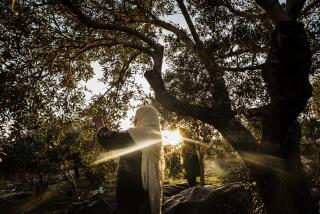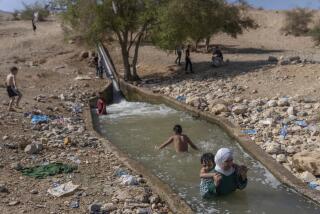Iraq’s Systematic Drainage of Wetlands Drives Out Marsh Arabs : Environment: Reputed site of the Garden of Eden is desolate now, its reeds, pelicans, wild boar and water buffalo gone. One resident compared the devastation to that wrought by Genghis Khan. Government calls it civilization.
- Share via
AL-HUWAIR, Iraq — The old man trudges along a dusty track through an abandoned village in southern Iraq. Stopping, he points to his former home, a mound covered in rubble lying like a beached whale on the plain.
Until two years ago, it was a tiny, man-made island in the middle of 6,000 square miles of marshland that was home to a people known as the Marsh Arabs.
“I used to swim all around here as a boy,” said Mahayal Ateia Msaver, 59, moving toward another mound, his rubber sandals crushing brittle, salt-encrusted vegetation underfoot.
“Now all the water is gone and the land is dry.”
Four and a half years after the Shiite Muslim uprising in southern Iraq, President Saddam Hussein’s systematic drainage of the marshes is complete, Iraqi officials say.
Saddam’s government says it drained the marshes to improve the lot of the Marsh Arabs by bringing in farming, roads, electricity and other trappings of civilization. Critics contend Hussein’s only motive was to remove an isolated refuge for opponents of his regime.
Many Marsh Arabs have left.
Believed by Muslims to be the site of the Garden of Eden, the former expanse of reeds and pelicans, wild boar and water buffalo now is desolate. Areas where water once stretched as far as the eye could see are now little more than salt pans dotted with brown, stagnant pools.
Dozens of dump trucks and earthmovers still work day and night building 20-foot-high earthen dikes across the former marshes.
Between the Tigris and Euphrates rivers, the man-made Saddam River now carries the floodwaters that once fed the marshes down to the Persian Gulf.
“It is as if Genghis Khan has returned,” whispered one English-speaking Marsh Arab, referring to the devastation wrought by the Mongol hordes that conquered the region in the 12th Century.
The man whispered his remark while out of earshot of the government escorts who took Western journalists to the marshes at al-Huwair and the nearby town of Qurnah, where the Tigris and Euphrates converge about 230 miles southeast of Baghdad.
Many Iraqis refuse to speak to Westerners or will speak only on condition of anonymity, fearing government retribution.
The ancient Marsh Arabs’ culture, which some experts date back nearly 6,000 years, has evaporated with the loss of the watery environment that molded it.
Traditional reed houses are scarce due to the lack of reeds. Those that remain no longer rise out of the waters like mini-cathedrals, but sit in landlocked villages surrounded by mud homes.
Tribal sheiks, once the personification of power, now have only symbolic authority.
Brides are no longer paddled to their grooms’ homes in canoes on their wedding night. Now they must walk or drive.
Iraqi government officials say they do not have population figures for the area from either before or after the draining. Western estimates range from 150,000 to 650,000 inhabitants just after the Persian Gulf War ended in 1991, dropping to between 50,000 and 100,000 by mid-1994.
It may never be known how many Marsh Arabs died in the unsuccessful Shiite uprising against Hussein or in subsequent fighting in the marshes themselves, or how many were driven out by the draining of the swamps. It is clear many people are gone.
Some can be seen working as laborers in the port of Basra. Others have been reported in Mosul and Kirkuk, more than 350 miles to the northwest, and in Amman, Jordan. Many are said to have taken refuge across the Iranian border.
“The culture will never be the same,” said Sir Wilfred Thesiger, a British traveler and author who spent seven years in the marshes in the 1950s.
He said the Marsh Arabs led good lives. “They lived off fish. They had water buffalo milk. There was never any poverty,” he said in an interview at his London home.
“It was utterly unique, but it can’t possibly survive now--not without the marshes,” Thesiger said.
Iraqi government officials disagree. They claim to have civilized the Marsh Arabs, bringing them electricity, education and health care.
Government officials deny allegations made by human rights groups, Western diplomats in Baghdad and governments abroad that Hussein drained the marshes to prevent further Shiite uprisings and to deny access to rebels based in Iran.
“They’ve grown closer to civilization. Some of them didn’t even wear shoes before and now they do,” said Latif Mahal Hamood, the governor of Basra province, which includes the former marshes.
“They’re now even building houses using bricks. They wish this change had come about hundreds of years ago and they hadn’t had to wait until now,” Hamood said.
The government claims the changes have come peacefully, but Iraqi soldiers can be seen throughout southern Iraq. Checkpoints guard the roads leading into the former marsh areas. There are a number of military bases in the vicinity, complete with tanks and armored personnel carriers.
Hamood said the marshes were drained to develop agriculture, not to crush the Marsh Arabs. He said his office is providing the Marsh Arabs with seeds, tools, fertilizer and agricultural training.
According to Hamood’s aides, each Marsh Arab family is allocated 100 to 500 acres of land. They said 420,000 acres have been cultivated under the program.
Some fields were being tilled, but when a reporter approached eight fields where farmers were working, each said he had come from town, not from the marsh.
Those Marsh Arabs who could be found in the region, near the Euphrates River west of Qurnah, were not making their living from farming. Many said they had had to sell their water buffalo.
Sabih Abd al-Zahra, a 51-year-old canoe maker, said life has become extremely difficult since the marshes disappeared. He said he used to sell dozens of canoes but now sells few. At best, he earns the equivalent of $5 a month, he said.
“Before, it was better,” Abd al-Zahra said. “We used to have grass, bamboo, fish and birds. The marshes used to stretch almost from here to Baghdad. . . . Now we only have the al-Ezz River and God.”
More to Read
Sign up for Essential California
The most important California stories and recommendations in your inbox every morning.
You may occasionally receive promotional content from the Los Angeles Times.













